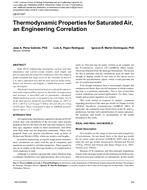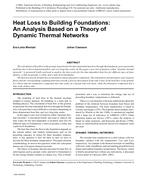Click here to purchase
Convective heat transfer coefficient (CHTC) is known to play an important role in the evaluation of heat exchange between a building and its surroundings. There are several correlations suggested for the estimation of CHTC from the external surfaces of a building. However, there is a marked difference between values obtained from these correlations under similar set of conditions. Therefore, there is a need for an extensive correlation addressing the discrepancies in some of the existing correlations. In the current study, the impact of built morphology, associated with different land-use classes (e.g., industrial, residential, or downtown, etc.), on the convective heat transfer from buildings is numerically investigated. CFD simulations are conducted in a Navier-Stokes solver with Reynolds stress turbulence model as a closure method. The surrounding buildings are expected to influence the local microclimate (wind speed and turbulence), which in turn will affect the CHTC of the study building. Arrays of building-like bluff bodies from different land-use class with several packing density representing different flow regimes, and a benchmarking isolated cube case, have been investigated. Frontal/planar densities of sections of various parts of cities, based on their land-use class – from literature, are used to relate CHTC findings from simulation to land-use classifications. The results indicate that the behavior of convective heat transfer from building surfaces significantly depends on the land-use class designation of the location of the study building. The development of land-use class based CHTC correlations is expected to reduce the bias resulting from using correlation based exclusively on isolated building studies.
Citation: ASHRAE/IBPSA-USA Bldg Simulation Conf, Sept 2020
Product Details
- Published:
- 2020
- Number of Pages:
- 8
- Units of Measure:
- Dual
- File Size:
- 1 file , 3.6 MB
- Product Code(s):
- D-BSC20-C025


